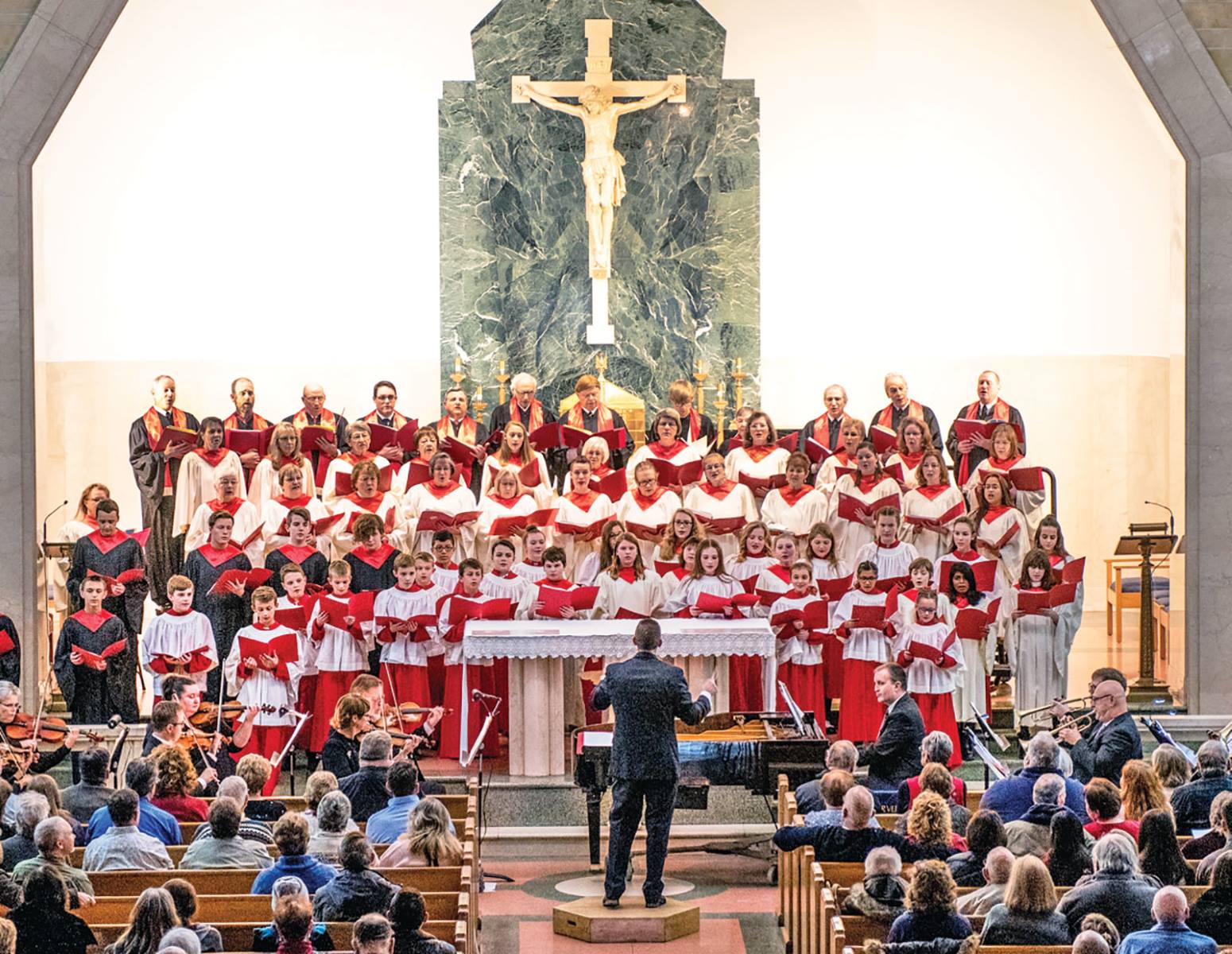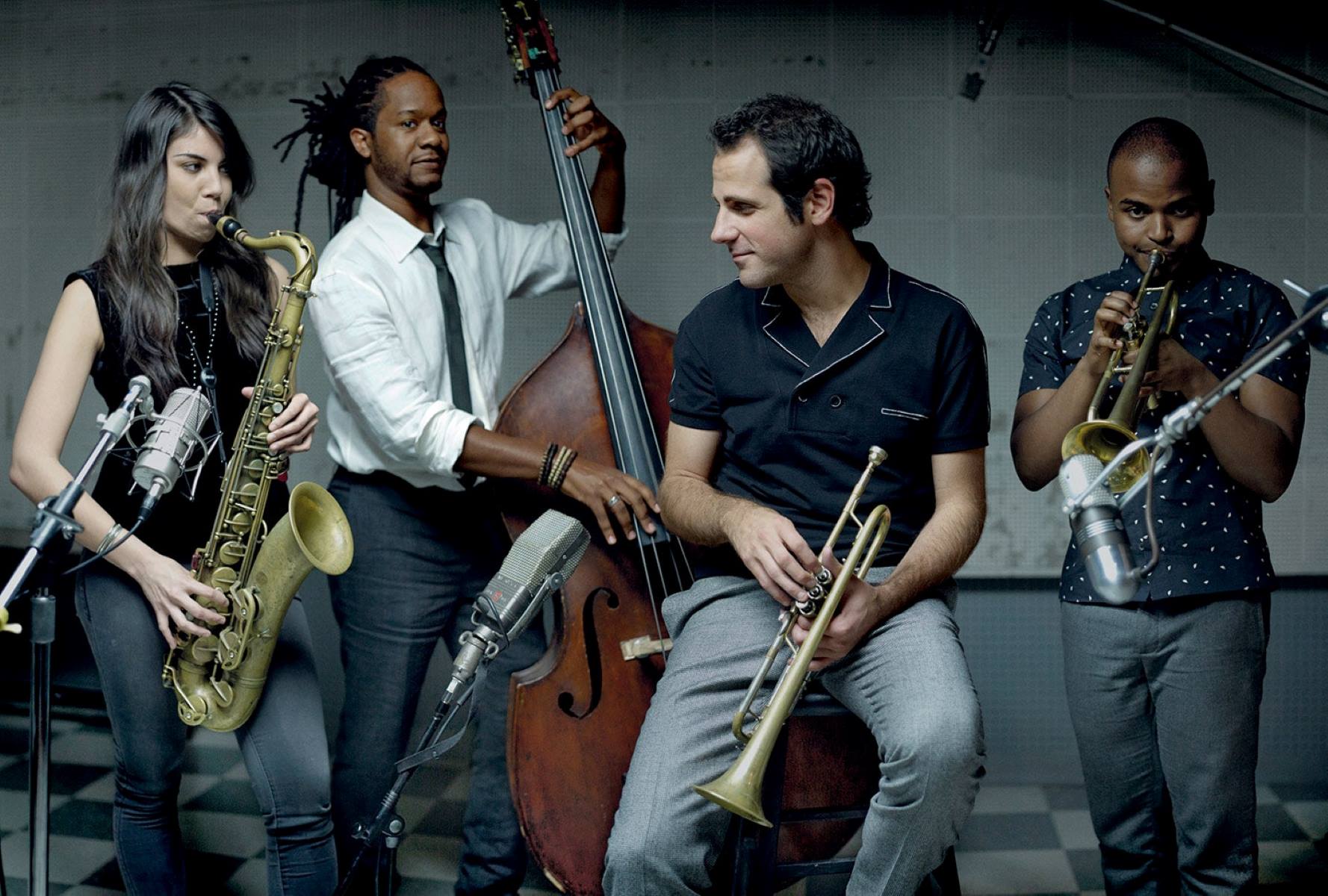Home>Production & Technology>Musician>How To Hire A Local Musician


Musician
How To Hire A Local Musician
Published: January 28, 2024
Looking to hire a local musician? Discover expert tips and tricks for finding the perfect musician for your event. Get started today!
(Many of the links in this article redirect to a specific reviewed product. Your purchase of these products through affiliate links helps to generate commission for AudioLover.com, at no extra cost. Learn more)
Table of Contents
- Introduction
- Step 1: Determine Your Needs
- Step 2: Research Local Musicians
- Step 3: Review Their Portfolio and Experience
- Step 4: Contact Potential Musicians
- Step 5: Schedule Auditions or Interviews
- Step 6: Conduct Auditions or Interviews
- Step 7: Negotiate Pricing and Terms
- Step 8: Finalize the Agreement
- Step 9: Prepare for the Event or Performance
- Conclusion
Introduction
Hiring a local musician can bring a unique and captivating experience to any event or performance. Whether you’re planning a wedding, corporate function, or a small gathering, having live music can elevate the ambience and create memorable moments for your guests.
However, finding the right musician for your specific needs can be a daunting task. With a vast pool of talent available, it’s crucial to have a systematic approach to ensure you choose the best fit for your event. In this article, we will guide you through the process of hiring a local musician, providing valuable tips and insights along the way.
From determining your needs and researching local musicians to conducting auditions or interviews, negotiating pricing and terms, and finalizing the agreement, each step is essential in ensuring a seamless hiring process. By following these steps, you’ll be well-equipped to find a talented musician who can bring your event to life.
Whether you’re looking for a solo artist, a band, or an ensemble, this guide will help you navigate the hiring process with confidence. So, let’s dive in and discover how to find and hire the perfect local musician for your event.
Step 1: Determine Your Needs
The first step in hiring a local musician is to determine your specific needs and requirements for the event or performance. Consider the type of music you want, the ambiance you wish to create, and the overall theme of your event. This will help you narrow down your search and find a musician who aligns with your vision.
Ask yourself questions like:
- What genre of music am I looking for?
- Do I want a solo musician or a band?
- Do I need background music or a featured performance?
- How long do I need the musician to perform?
- What is my budget for hiring a musician?
Understanding these factors will help you create a clear and concise brief when communicating with potential musicians.
Additionally, consider the logistics of your event, such as the venue size, the acoustics, and any technical requirements the musician may need. Providing this information upfront will help both you and the musician make informed decisions during the hiring process.
By taking the time to determine your needs, you’ll have a solid foundation for selecting a musician who can exceed your expectations and provide an unforgettable experience for your guests.
Step 2: Research Local Musicians
Once you have a clear idea of your needs, it’s time to start researching local musicians in your area. Utilize online platforms, such as social media, music directories, and event booking websites, to find a wide range of talented musicians.
Start by searching for keywords related to your desired music genre or specific instrument. This will help you discover musicians who specialize in the style you’re seeking. Pay attention to their online presence, including their website, social media profiles, and any videos or recordings they have available.
When researching musicians, consider the following:
- Experience: Review the musician’s background and professional experience. Look for any testimonials or reviews from previous clients to gauge their level of expertise.
- Portfolio: Explore their portfolio of past performances or recordings. This will give you a sense of their musical style, versatility, and overall quality of their work.
- Availability: Check their availability for your event date and ensure they can accommodate the duration of your performance.
- Reputation: Look for any industry recognition or awards the musician has received. A well-established musician with a positive reputation is more likely to deliver a high-quality performance.
During your research, make a shortlist of potential musicians who stand out based on your preferences and requirements.
Additionally, reach out to friends, family, and colleagues who may have hired local musicians in the past. Their recommendations can be valuable in finding trusted and reliable musicians.
Remember, thorough research is key in finding the right musician who can match your vision and create an unforgettable experience for your event.
Step 3: Review Their Portfolio and Experience
After compiling a list of potential musicians, it’s time to dive deeper into their portfolio and experience. This step will help you assess their skill level, style, and suitability for your event.
Start by visiting the musicians’ websites or social media pages to explore their portfolio. Look for audio or video recordings of their performances to get a sense of their musical abilities. Pay attention to the following:
- Quality: Evaluate the overall quality of their recordings. Pay attention to the sound clarity, instrument proficiency, and vocal abilities (if applicable).
- Variety: Assess the range of genres and styles the musician is capable of playing. This will give you an idea of their versatility and ability to cater to different audiences.
- Engagement: Observe how the musician interacts with the audience during live performances. A charismatic and engaging performer can enhance the overall experience for your guests.
In addition to reviewing their portfolio, consider the musicians’ experience and professional background. Look for the following indications of their expertise:
- Past Performances: Check if they have performed at similar events or venues in the past. This can give you confidence in their ability to adapt to different environments and meet your expectations.
- Training and Education: Look for any formal training or education related to music. This showcases their commitment to honing their craft and acquiring the necessary skills.
- Collaborations: Take note of any collaborations the musician has had with renowned artists or bands. This can be a testament to their talent and recognition within the music industry.
By thoroughly reviewing their portfolio and experience, you can make an informed decision about whether the musician is a good match for your event. Remember to prioritize quality, versatility, and professionalism in your assessment.
Step 4: Contact Potential Musicians
Now that you have narrowed down your list of potential musicians, it’s time to reach out and contact them. This step is essential for gathering more information, discussing your event requirements, and assessing their availability.
Start by drafting a concise and professional email or making a phone call to introduce yourself and express your interest in hiring them for your event. Be sure to include the following information in your communication:
- Event Details: Provide the date, time, and location of your event. Mention any specific requests or themes you have in mind.
- Performance Duration: Clearly state the duration of the performance you are looking for. This will help the musician assess their availability and schedule.
- Contact Information: Include your contact details so they can easily get back to you.
When contacting potential musicians, it’s important to ask them a few key questions to gauge their suitability for your event:
- Availability: Confirm that they are available on your event date and inquire about any potential scheduling conflicts.
- Pricing: Discuss their rates and any additional fees they may charge, such as travel expenses or equipment rentals.
- Equipment Requirements: Inquire about the equipment they will bring and if they require any specific technical arrangements at the venue.
Be prepared to answer any questions they may have about your event. Clear communication from both parties is crucial to ensure a smooth and successful collaboration.
Remember to be professional, respectful, and prompt in your communication. Respond to any inquiries or follow-ups in a timely manner, as musicians often have busy schedules and may be considering other opportunities as well.
By contacting potential musicians and gathering more information, you are one step closer to finding the perfect fit for your event.
Step 5: Schedule Auditions or Interviews
Once you have contacted potential musicians and assessed their availability and interest, the next step is to schedule auditions or interviews. This gives you the opportunity to witness their talent firsthand and evaluate their suitability for your event.
When scheduling auditions or interviews, consider the following:
- Location: Determine a suitable location for the auditions or interviews. It could be your event venue, a rehearsal space, or a mutually agreed-upon location.
- Timing: Find a date and time that works for both you and the musician. Consider any other commitments they may have and ensure you have ample time to observe and engage with them.
- Preparation: Communicate any specific requirements or pieces you would like the musician to perform during the audition. This will allow you to assess their ability to meet your event’s musical needs.
During the auditions or interviews, be attentive and take note of the following:
- Technical Proficiency: Evaluate the musician’s technical skills, including their instrument handling, vocal abilities, and overall musicianship.
- Adaptability: Assess their ability to adapt to different music styles, tempos, and audience dynamics. Look for versatility and flexibility in their performance.
- Professionalism: Observe their punctuality, preparedness, and overall demeanor during the audition or interview. A professional and reliable musician is crucial for a successful event.
Take the opportunity to ask the musician questions about their experience, their approach to performing, and how they can contribute to making your event exceptional. This will help you gain a better understanding of their mindset and how they align with your vision.
Keep in mind that auditions or interviews are not only about assessing their skills but also about building rapport and determining if the musician is a good fit for your event. Trust your instincts and consider the overall impression you have of the musician.
By scheduling auditions or interviews, you can make a more informed decision and select the musician who best aligns with your event requirements and vision.
Step 6: Conduct Auditions or Interviews
Now that you’ve scheduled auditions or interviews with potential musicians, it’s time to conduct them and assess the talent and suitability of each candidate for your event. This step allows you to see the musicians in action and evaluate their performance and compatibility with your vision.
During the auditions or interviews, follow these guidelines:
- Be Prepared: Have a clear plan for each audition or interview. Prepare specific questions or musical pieces you want the musicians to perform to assess their skills and versatility.
- Create a Comfortable Environment: Set up a welcoming and relaxed atmosphere so that musicians can perform to their fullest potential. Ensure the space is conducive to auditions and interviews, including proper lighting and acoustics.
- Observe and Take Notes: Pay close attention to each musician’s technical abilities, stage presence, and overall performance. Take notes to help compare and evaluate the candidates later.
- Ask Relevant Questions: Engage with the musicians during interviews, asking about their experience, musical influences, and their understanding of your event’s requirements. This will give you insight into their professionalism and enthusiasm.
- Seek Feedback: If possible, have a trusted individual or a panel of people who understand your event’s goals and musical requirements present during auditions or interviews. Seek their input and feedback to gather different perspectives.
Allow each musician an equal opportunity to showcase their talent and style. Encourage them to bring their authentic selves to the audition or interview, as this will help you determine if their musical approach aligns with your vision.
Remember that auditions or interviews are not just about technical expertise but also about assessing the musician’s ability to connect with the audience, adapt to different styles, and deliver a memorable performance.
Take your time during this process and trust your instincts. Assess the chemistry between you and the musician and how well they understand your event’s requirements. Consider not only their musical abilities but also how they contribute to your event’s overall atmosphere and experience.
By conducting auditions or interviews, you’ll be able to identify the musician who resonates with you and has the potential to deliver an exceptional performance at your event.
Step 7: Negotiate Pricing and Terms
Once you have identified the ideal musician for your event, it’s time to enter into negotiations regarding pricing and terms. This step involves discussing the financial aspects of hiring the musician and finalizing the contractual agreement.
When negotiating pricing and terms, consider the following:
- Be Clear About Your Budget: Have a clear understanding of your budget and communicate it to the musician. This will help both parties determine if the financial expectations align.
- Discuss Performance Fees: Negotiate the musician’s performance fee based on factors such as the duration of the performance, the complexity of the musical repertoire, and their experience and reputation.
- Clarify Additional Costs: Inquire about any additional costs that may arise, such as travel expenses or equipment rentals. Ensure that both parties are aware of and agree to these potential expenses.
- Outline the Scope of the Performance: Clearly define the musician’s responsibilities, including the specific songs or repertoire to be performed, the duration of the performance, and any additional elements such as audience interaction or announcement requirements.
- Discuss Contractual Terms: Address crucial aspects such as payment terms, deposit requirements, cancellation policies, and any other relevant contractual clauses. It is important to have a written agreement that protects the interests of both parties.
During the negotiation process, be open to finding a middle ground that satisfies both your requirements and the musician’s expectations. Consider the value that the musician brings to your event and the impact their performance will have on the overall experience for your guests.
Remember to maintain open and transparent communication throughout the negotiation process. Discuss any concerns or questions you may have and ensure that the musician understands your expectations clearly.
Once all terms are agreed upon, it is advisable to have a written contract that includes all the discussed terms and conditions. This will provide a legal framework and give both parties peace of mind.
Negotiating pricing and terms is an important step in securing the services of the chosen musician for your event. By coming to a mutual agreement and having a clear understanding of the financial and contractual details, you can ensure a successful collaboration.
Step 8: Finalize the Agreement
After negotiating pricing and terms with the selected musician, it’s essential to finalize the agreement to solidify the partnership and ensure a smooth and successful event. This step involves reviewing and signing the contract, making the necessary payments, and confirming all the details.
Here are the key actions to take to finalize the agreement:
- Review the Contract: Carefully go through the contract to ensure that all agreed-upon terms and conditions are accurately documented. Verify the performance date, duration, payment details, cancellation policies, and any specific provisions you discussed.
- Seek Legal Advice (if necessary): If you have any concerns or doubts about the contract or legal terminology, consult with a legal professional who can provide guidance and ensure that your interests are protected.
- Sign the Contract: Both you and the musician should sign the contract to indicate your agreement with the terms set forth. This makes the agreement legally binding and outlines the obligations and responsibilities of both parties.
- Make the Required Payments: Determine the payment schedule outlined in the contract and make the necessary payments according to the agreed-upon terms. This may include a deposit upfront or partial payments leading up to the event, with the final balance settled after the performance.
- Confirm Event Details: Double-check all the event details, such as the venue, start time, and any specific setup requirements the musician may have. Ensure that all logistical aspects are in place to guarantee a smooth experience for both you and the musician.
By completing the finalization process, you establish clarity and trust between you and the musician. This ensures that both parties are fully committed to delivering a successful event.
Keep a copy of the signed contract for your records, as well as any receipts or confirmation of payments made. These documents provide evidence of the agreed-upon terms and can be referred to if any issues or misunderstandings arise.
Remember, effective communication and thorough documentation are crucial for a successful partnership and event. By finalizing the agreement, you can proceed with confidence, knowing that the necessary steps have been taken to ensure a smooth collaboration with the chosen musician.
Step 9: Prepare for the Event or Performance
As the event or performance date approaches, it’s crucial to adequately prepare to ensure a seamless and successful experience. This step involves coordinating with the musician, organizing logistics, and ensuring that everything is in place for a memorable performance.
Here are the key actions to take in preparing for the event or performance:
- Communication with the Musician: Maintain open lines of communication with the musician leading up to the event. Confirm details such as the final repertoire, performance duration, and any specific requirements they may have, including stage or sound setup.
- Coordinate Logistics: Arrange for the necessary equipment, instruments, and sound system if required. Ensure that the venue is adequately prepared, including proper lighting, seating arrangements, and any other technical requirements specified by the musician.
- Rehearse and Fine-Tune: If possible, schedule a rehearsal session with the musician prior to the event. This allows for any last-minute adjustments, timing considerations, or new requests to be addressed, ensuring a smooth and flawless performance.
- Confirm Event Timeline: Double-check the event timeline, including the musicians’ arrival time, setup time, and performance schedule. Ensure that all other vendors and event staff are informed of the musician’s requirements and time frame.
- Promote the Performance: If appropriate, promote the musician’s performance within your event, whether through social media, event invitations, or promotional materials. This helps generate excitement and anticipation among attendees.
- Prepare a Backup Plan: While it’s unlikely, unexpected circumstances can arise. Have a backup plan in place, such as a substitute musician or alternative entertainment options, to ensure the event can proceed smoothly in case of any unforeseen circumstances.
By actively preparing for the event or performance, you demonstrate professionalism and dedication to delivering an exceptional experience for your guests.
Consider creating a checklist to ensure that all necessary tasks are completed leading up to the event. Stay organized and stay in touch with the musician to address any last-minute questions or concerns.
Remember, attention to detail and effective coordination contributes to the overall success of the event or performance and ensures a memorable experience for all involved.
Conclusion
Hiring a local musician for your event can elevate the atmosphere, create memorable moments, and leave a lasting impression on your guests. By following the steps outlined in this guide, you can navigate the process with confidence and find the perfect musician who aligns with your vision and event requirements.
Starting with determining your needs, researching local musicians, and reviewing their portfolio and experience, you lay the foundation for making informed decisions. Contacting potential musicians, scheduling auditions or interviews, and conducting thorough assessments allow you to identify the talent that resonates with you and your event.
Negotiating pricing and terms, finalizing the agreement, and preparing for the event or performance ensure that all logistical aspects are in place and both parties are fully committed. Effective communication and attention to detail contribute to a seamless collaboration and a successful event.
Remember to trust your instincts and make choices that align with your goals and expectations. Each step of the hiring process is an opportunity to find the musician who can bring your event to life and create the desired ambiance.
Lastly, enjoy the journey of hiring a local musician. Embrace the creativity, passion, and talent they bring to your event and create an extraordinary experience for yourself and your guests.
Now that you have the knowledge and guidance to hire a local musician, it’s time to start your search and turn your event into an unforgettable musical experience.











